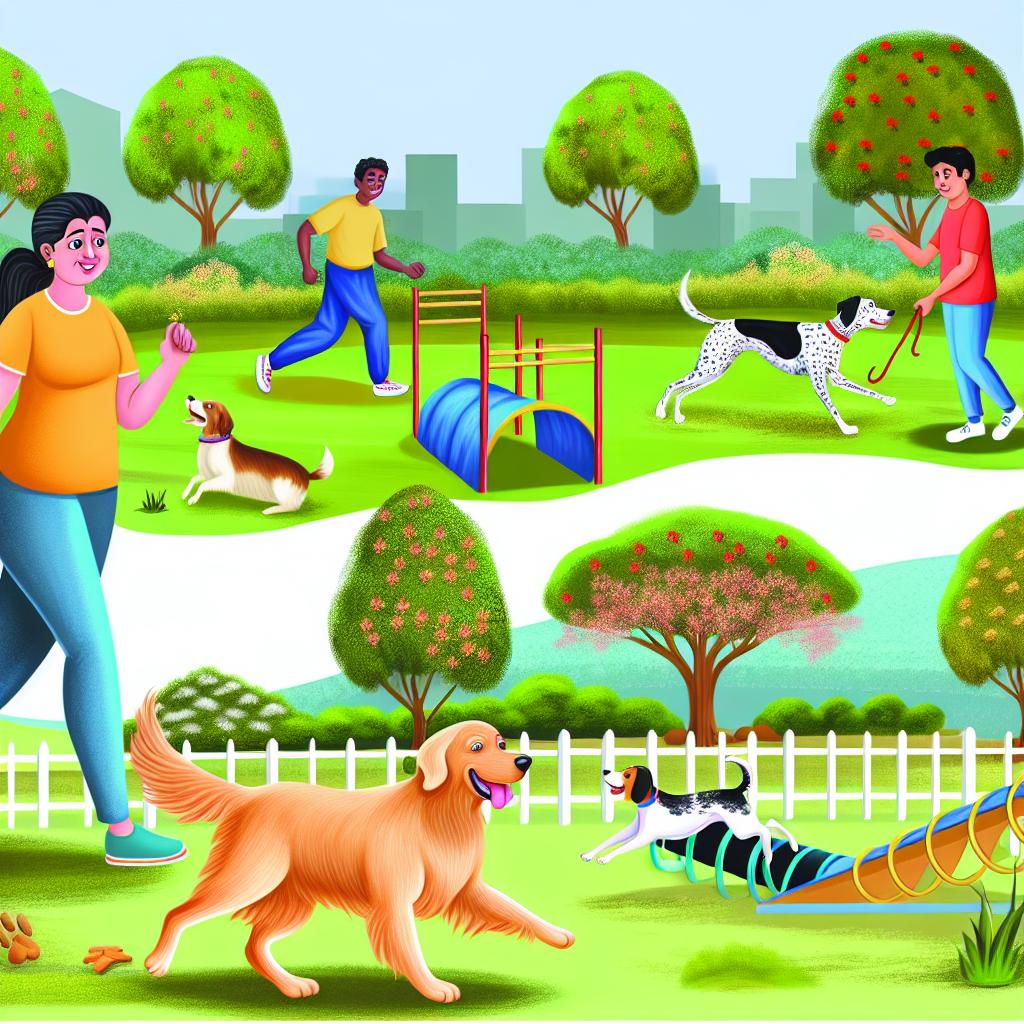
Maintaining an active lifestyle for your dog is crucial for its overall health and well-being. Regular physical activity helps prevent obesity, enhances mental stimulation, and can increase your pet’s lifespan. This article explores various ways to keep your dog active and healthy, focusing on a balanced approach to exercise, diet, and mental stimulation.
Ensuring your dog gets adequate exercise is fundamental to keeping it healthy. The amount of exercise required depends on the breed, age, and overall health condition of your dog.
Daily Walks: Regular walks are essential. They not only provide physical exercise but also mental stimulation as your dog explores new environments and encounters different smells. Walking your dog helps with socialization as they often meet other dogs and people, which is vital for emotional development. Emphasizing on daily walks varies between short brisk strolls to more extended ones, allowing flexibility depending on your schedule and your dog’s eagerness to roam.
Structured Play: Activities such as fetch, frisbee, or agility courses can help burn excess energy while strengthening the bond between you and your dog. These activities improve coordination and provide a good cardiovascular workout. Engaging in structured playtime is an excellent method to train your dog to follow commands while having fun. The interaction during these games develops obedience, focus, and can prevent behavioral problems stemming from boredom or excess energy.
Swimming: For dogs who enjoy the water, swimming is an excellent low-impact exercise that is easy on the joints. This can be particularly advantageous for older dogs or those with arthritis. Since swimming exercises multiple muscle groups without putting strain on the bones, it is highly beneficial for breeds with predispositions to joint issues. Introducing your dog to water gradually can also minimize anxiety and build confidence in their swimming skills.
A well-balanced diet is critical for maintaining your dog’s health. The diet should be tailored to your dog’s age, size, and breed, ensuring all nutritional needs are met and developing a robust immune system.
Quality Dog Food: Choose a high-quality commercial dog food or consult with a veterinarian to create a balanced homemade diet. Look for foods that are rich in protein and contain essential nutrients. An appropriate diet supports muscle development, organ function, and overall vitality. Ensuring your dog receives a blend of carbohydrates, fats, vitamins, and minerals contributes to their long-term health.
Portion Control: Overfeeding can lead to obesity, which is a significant health risk for dogs. Follow feeding guidelines and adjust portions based on your dog’s activity level. Maintaining an ideal weight is crucial for joint health and mobility, ensuring sustained playful antics without undue pressure on the joints. Understanding caloric needs can prevent overconsumption and maintain a balanced energy level conducive to regular exercise.
For further information on appropriate dog diets, you can visit this external resource provided by a reputable veterinary organization.
Keeping your dog’s mind active is as important as physical exercise. Mental activities can prevent boredom, reduce anxiety, and improve overall behavior, leading to a happier and well-adjusted pet.
Puzzle Toys: Use interactive toys and puzzles that challenge your dog to think and solve problems to earn a reward. These activities require concentration and persistence, tapping into your dog’s problem-solving instincts while keeping them engaged. Puzzle toys allow dogs to work independently and are perfect for when the owner is occupied, balancing physical and mental exertion.
Training Sessions: Regular training sessions can teach your dog new commands and tricks, providing mental engagement and reinforcing good behavior. Training nurtures a respectful and trusting bond between you and your dog while offering mental stimulation through learning and repetition. Teaching new tricks also boosts your dog’s confidence and deepens the owner-pet relationship.
Socialization: Encourage your dog to interact with other dogs and people. This enhances their social skills and provides an outlet for mental and physical energy. Socialization is a critical component in preventing aggression and anxiety, promoting better behavior in diverse situations. This aspect is critical, particularly for puppies, as exposure to various stimuli shapes their adaptability.
Routine veterinary visits are essential for monitoring your dog’s health. Regular check-ups allow early detection of potential health issues and ensure your dog is up to date with vaccinations, supporting a preventative approach to health care.
Health Screenings: Annual health screenings can help detect underlying conditions such as heart disease, diabetes, or arthritis, allowing for timely intervention. These routine check-ups can significantly contribute to managing chronic conditions and extending your pet’s lifespan, maximizing their years of companionship with the family.
Quick consultation with a veterinarian can be sought through this useful resource for guidance on maintaining your pet’s health.
A well-rounded routine that balances exercise, nutrition, and mental stimulation ensures overall well-being for your dog. Understanding each dog’s unique needs according to their age, breed, and health status allows for a personalized care plan. This adaptability forms the core of comprehensive health management, promoting a lifestyle that fulfills physical, psychological, and emotional needs effectively.
Incorporating a mix of physical exercise, balanced nutrition, and mental stimulation is essential for keeping your dog active and healthy. Additionally, regular veterinary check-ups will help maintain their health and prevent potential issues. By providing a well-rounded lifestyle, you ensure your furry friend’s optimal health and happiness for years to come. Investing time and effort into responsible pet ownership produces benefits, including a noticeable improvement in your dog’s quality of life and the companionship shared.